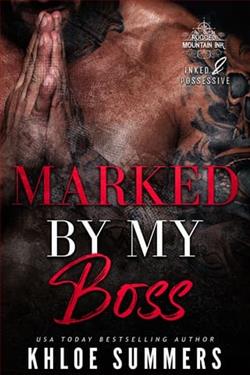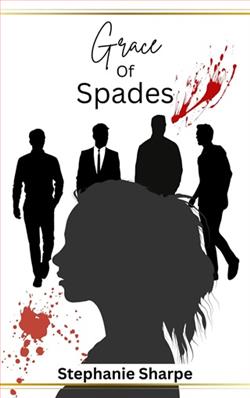Page 1 of Bird on a Blade
PROLOGUE
SAWYER
August nights are the first gasp of summer’s death. There’s a chill that creeps into them like in a drafty old house; you can feel the leaves curling into themselves, the green starting to burn away. If you’re really lucky, a fog rises up from the valley, cobwebbing the forest.
I think that’s why I’ve always found August the sweetest time for killing.
I slide through the silent camp, heavy boots thudding softly against the grass. Three of them are dead already. I hunt the fourth now, a boy with shorn hair and big muscles. I’ve no doubt he’ll put up a fight, but it’ll be mostly bluster.
A crack of movement from my left. I turn in time to see a pale blur shoot out of one of the cabins. It’s him. He pants as he runs, arms pumping like a track star. He doesn’t see me.
He’s heading for the dining hall, probably assuming he can call for help there. He can’t; I already saw to that. Cut the landlines. Smashed the CB radio and all their cell phones. If he thinks he can get to a phone, then they aren’t communicating with each other, like the cruel, stupid children that they are.
I let him think he’s safe. I let him slam, panicked, into thedining hall. Then I walk slowly through the shadows, clutching my Bowie knife at my side, the blade wiped clean of blood. I like the way it catches the moonlight, flashing cataracts of terror into their faces right before they die.
He barred the dining hall door, half-heartedly. I consider creeping around the back. It’s a big building; it has three entrances and at least one of them I doubt this stupid boy knows anything about. But it’s late. I want to be done by sunrise.
So I shove the door open with a clatter, stacked chairs flying and splintering against the old linoleum. The light is on, sallow and buzzing. Footsteps echo from the kitchen. I go there, slow and deliberate, squeezing my fingers more tightly around the knife handle. He’s panicked; I can hear his breathing even though he’s not running. A low, keening whimper that makes me smile.
I shove through the swinging kitchen doors, and there he is, crouched next to the big industrial refrigerator, a pale glowing rectangle in one hand.
A cell phone. My heart rate spikes. I thought I had destroyed all of them?—
Not hers.
How does this worm have her cell phone? Did she leave it in here? I hadn’t sought it out when I was destroying the others—I’d left it for her. A gift, I guess. I knew it was a loose end, of course, but I had planned to work quickly.
“He’s here!” the boy shrieks. A voice spills out of the other end of the phone, tinny and distant. “He’s?—”
I swing my knife and spear the phone, setting aside the quiver of regret. It’s just a phone.
The boy scrambles away, too panicked to move properly. His feet tangle underneath him, and he falls on his ass, face lifted to me, features twisted in fear.
Maybe he isn’t going to put up a fight, after all.
I grab him by the hem of his shirt,Head Start Fitness Campemblazoned across his chest, and then slam him up againstthe wall. He howls and kicks uselessly at me, face red with terror. I study him for a minute. It’s always an odd moment, seeing them up close for the first time after weeks of watching from the woods. It solidifies them. Makes them real.
“No,” he begs, a few fat tears streaking over his cheeks. “You don’t have to do this. You don’t?—”
I slide the knife into his side, positioning it just beneath his ribs, and then jerk it sideways so that a hot, pleasant waterfall of blood and viscera splatters across my chest. He twitches in my grip, one last gasp of life that I breathe into my lungs. My body shudders with pleasure, and I let him fall like old meat.
There’s a long stretch of silence.
And then I hear it. Soft, sweet whimpering.
Her.
My heart twists with excitement, knowing that she’s seen all I’ve done for her. I turn slowly, trying not to betray that excitement, and find her standing in the doorway of the kitchen, one hand on the frame as if she can barely hold herself up. This is the closest I’ve ever been to her since I first saw her through the dappled light of the trees.
She stares at me, eyes wide as saucers, plush body trembling. Blood stains the shirt stretched across her ample chest, and I startle at that, I’ll admit—it means she helped one of my victims, maybe provided them comfort as they lay dying. But why, when they’ve been so unrelentingly cruel to her for the last two months?
I step toward her, and she doesn’t move except to part her lips slightly, her terrified gaze drinking me. I wear my mask, the mask that at this point is a second skin. I consider taking it off, showing her who I am, but something stays my hand. Her fear, maybe. I don’t particularly want her to be afraid.
I take another step, half-expecting her to bolt like the feral cats that live around my house high up on the mountain. But she doesn’t, and that makes my heart flutter weirdly and my stomachknot up. Like maybe she’s not as untouchable as I thought. Like maybe I’ll be able to reach out and run my fingers over her thick black hair and smooth, satiny skin.
Another step. She whimpers, then slaps her hand over her mouth. Her eyes gleam with tears, and I realize she’s dropped her gaze down to my Bowie knife, which I hold unthreateningly at my side, even as it drips blood across the tile.
“Shh,” I say, as if I’m talking to the cats. Her eyes, somehow, go a little wider. “Don’t be afraid.”















